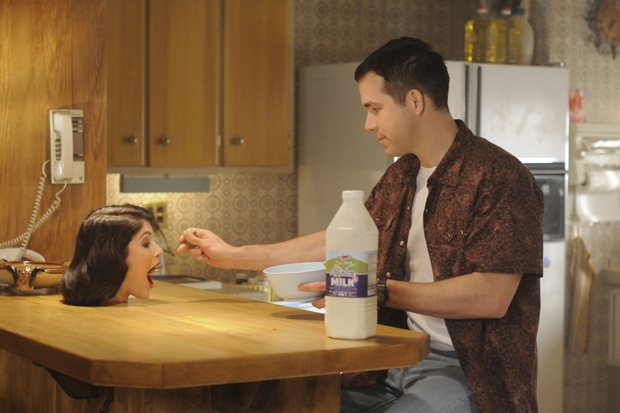The Voices is ‘a dark comedy about a serial killer’, which is not an overcrowded genre, and I think we can now plainly see for why. I was up for it, initially. The buzz around the film had been good. ‘Unexpectedly pleasurable’, GQ. ‘Wild and hilarious’, Hollywood Reporter. Which just goes to show: never, ever trust reviews. This is a hateful and repellent and empty film. This is not pleasurable, unexpectedly, expectedly, or otherwise and it is neither wild nor hilarious. I bitterly resent each of the 104 minutes I gave to it, and I say that as someone who never has anything better to do. It may even be that I’ll never read another review again.
This is directed by Marjane Satrapi, whose first film, Persepolis, was a charming animation based on her own coming of age in Iran, so God knows what happened here. We can only hope she has since drawn the curtains, draped a cold flannel over her forehead, had a lie-down, and is over it now. It is set in Milton, a small American town that comes highly stylised in the visual manner of John Waters or Wes Anderson or even the Coen brothers, so nothing new to report here. In particular, it is set at the Milton Bathtub Factory, where everyone wears pink overalls and where all the pink forklifts will dance in unison, although I couldn’t tell you why. I can only tell you the tone of this is all over the place. Slashings in the woods one minute, dancing pink forklifts the next. Go figure.
Our hero, if he’s that, is Jerry (Ryan Reynolds), who works in the shipping and packing department and seems like a harmless, happy man-child. He is excited about the work barbecue, and lusts after Fiona (Gemma Arterton), the hottie from accounts, and if you want to know what kind of film this is in one sentence, it’s the kind of film that has a Fiona from accounts in it. Jerry desires Fiona the most, but there are also her co-workers: Lisa (Anna Kendrick) who, we are given to understand, is more on his level, and Alison (Ella Smith), who is fat, so she can go hang. Or she’ll do, as a last resort. This league table of attractiveness (Premiere League, mid-table, Vauxhall Conference) is so offensive that, if I’d had something better to do, I’d have upped and gone and done it. As it is, I’m mad I didn’t walk out, go home and turn over the corner on the top sheet of my toilet rolls or something.
I’m furious, furious, furious, and we haven’t even arrived at the meat of this film yet, which has to do with Jerry’s true state of mind. There are early indications all is not right. He has regular appointments with a psychiatrist (Jacki Weaver) who begs him to take his medication. And he lives in an apartment with a talking cat and a talking dog. The cat is a bad, bad cat. ‘Kill!’ urges the cat. The dog is a good, good dog. ‘Don’t!’ urges the dog. The voices are projections of the voices in Jerry’s head. The film makes a big deal of revealing this later on, but I think you’d have to be pretty dumb not to have worked this out from the off. So not a spoiler, just as it’s not a spoiler to say his date with Fiona goes horribly wrong and her decapitated head ends up on his kitchen counter, as that’s the publicity still. Fiona’s decapitated head talks too. Fiona’s head says, ‘I want a friend,’ so the cat says, ‘kill, kill!’ while the dog says, ‘don’t, don’t!’ and you say, ‘Oh God, how much longer to go. My toilet rolls need me! Those corners are probably partying behind my back!’ Needless to say, it ends badly for all the women — including the psychiatrist — who we must witness being terrorised and slashed about, which is pleasurable for whom, exactly? Which is wild and hilarious on what level, exactly?
The Voices doesn’t work as a comedy because it isn’t funny, and it doesn’t work as a thriller because it’s not suspenseful, and it doesn’t work as an exploration of schizophrenia, if that is what this is meant to be about, as it’s not insightful. Jerry is awarded a back story to do with a violent father and a German mother (why German?) who also heard voices, but this is so clumsily told in flashback, is so obviously Back Story, it fails to win us over to Jerry’s side, which, I’m assuming, was the intention. I felt no sympathy for Jerry, only revulsion. Revulsion and boredom, that’s what I vacillated between, and now you must promise me that you’ll never, ever trust any review ever again. Got that? Good.






Comments